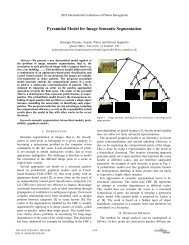Abstract book (pdf) - ICPR 2010
Abstract book (pdf) - ICPR 2010
Abstract book (pdf) - ICPR 2010
- TAGS
- abstract
- icpr
- icpr2010.org
Create successful ePaper yourself
Turn your PDF publications into a flip-book with our unique Google optimized e-Paper software.
gaze estimation improved by 61:06% horizontally and 52:23% vertically with respect to the gaze estimation obtained by<br />
the head pose only. A user study shows the potential of the proposed system.<br />
09:00-11:10, Paper ThAT9.57<br />
Discrimination of Moderate and Acute Drowsiness based on Spontaneous Facial Expressions<br />
Vural, Esra, Univ. of California San Diego<br />
Bartlett, Marian Stewart, Univ. of California San Diego<br />
Littlewort, Gwen, Univ. of California San Diego<br />
Cetin, Mujdat, Sabanci Univ.<br />
Ercil, Aytul, Sabanci Univ.<br />
Movellan, Javier, Univ. of California San Diego<br />
It is important for drowsiness detection systems to identify different levels of drowsiness and respond appropriately at<br />
each level. This study explores how to discriminate moderate from acute drowsiness by applying computer vision techniques<br />
to the human face. In our previous study, spontaneous facial expressions measured through computer vision techniques<br />
were used as an indicator to discriminate alert from acutely drowsy episodes. In this study we are exploring which<br />
facial muscle movements are predictive of moderate and acute drowsiness. The effect of temporal dynamics of action<br />
units on prediction performances is explored by capturing temporal dynamics using an over complete representation of<br />
temporal Gabor Filters. In the final system we perform feature selection to build a classifier that can discriminate moderate<br />
drowsy from acute drowsy episodes. The system achieves a classification rate of .96 A’ in discriminating moderately<br />
drowsy versus acutely drowsy episodes. Moreover the study reveals new information in facial behavior occurring during<br />
different stages of drowsiness.<br />
11:10-12:10, ThPL1 Anadolu Auditorium<br />
J.K. Aggarwal Prize Lecture:<br />
Scene and Object Recognition in Context<br />
Antonio Torralba Plenary Session<br />
Computer Science and Artificial Intelligence Laboratory<br />
Dept. of Electrical Engineering and Computer Science<br />
MIT, USA<br />
Recognizing objects in images is an active area of research in computer vision. In the last two decades, there has been<br />
much progress and there are already object recognition systems operating in commercial products. Most of the algorithms<br />
for detecting objects perform an exhaustive search across all locations and scales in the image comparing local image regions<br />
with an object model. That approach ignores the semantic structure of scenes and tries to solve the recognition problem<br />
by brute force. However, in the real world, objects tend to co-vary with other objects, providing a rich collection of<br />
contextual associations. These contextual associations can be used to reduce the search space by looking only in places in<br />
which the object is expect to be; this also increases performance, by rejecting image patterns that appear to look like the<br />
target object but that are in unlikely places.<br />
As the field moves into integrated systems that try to recognize many object classes and learn about contextual relationships<br />
between objects, the lack of large annotated datasets hinders the fast development of robust solutions. In this talk I will<br />
describe recent work on visual scene understanding that try to build integrated models for scene and object recognition,<br />
emphasizing the power of large database of annotated images in computer vision.<br />
ThBT1 Marmara Hall<br />
Object Detection and Recognition - V Regular Session<br />
Session chair: Wang, Yunhong (Beihang Univ.)<br />
13:30-13:50, Paper ThBT1.1<br />
Finding Multiple Object Instances with Occlusion<br />
Guo, Ge, Chinese Acad. of Sciences<br />
Jiang, Tingting, Peking Univ.<br />
Wang, Yizhou, School of EECS, Peking<br />
Gao, Wen, Peking Univ.<br />
- 279 -



